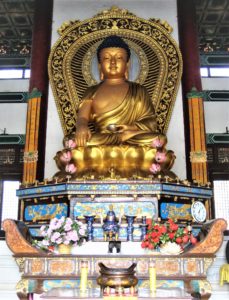
A double-edged question.
The local ruler, called Abhaya, went to Nataputta, a monk who belonged to a community hostile to the Buddha. Nataputta said to Abhaya: ‘If you were to defeat Gautama, whom they call the Buddha, in public debate, your reputation would be hugely enhanced,’ Abhaya said: ‘How can I defeat Gautama in debate? His power is too great, and his ability is too vast.’
Nataputta said: ‘Go to Gautama, and ask him this question: “Would an enlightened person ever utter words which were disagreeable and unpleasant to others?” If he replies that an enlightened person would speak in such a way, say to him: “Then there is no difference between an enlightened person and an ordinary person; ordinary people frequently utter words which are disagreeable and unpleasant to others.” But if he replies that an enlightened person would never speak in such a way, say to him: “Then you cannot be enlightened; you said that our cousin and enemy Devadutta will suffer for an aeon, and your words made him angry.”‘
Nataputta continued: ‘Thus, when you ask this double-edged question, Gautama will be unable either to spew it out or to swallow it. It will be as if a piece of barbed iron were stuck in his throat.
Abhaya agreed to this plan; and he immediately went to the Buddha. He invited him for a meal the following day, with the intention of asking the question afterwards.
Abhayarajakumara Sutta: Majjhima Nikaya 1.393-395
The Buddha’s principles for speech.
The Buddha came to Abhaya’s palace the following day; and the prince served the Buddha himself, giving him the finest food. Then after the meal Abhaya asked the Buddha; ‘Would an enlightened person ever utter words which were disagreeable and unpleasant to others?’ The Buddha said, ‘Is not this question double-edged?’ Abhaya exclaimed: ‘Nataputta and his community are already defeated.’ The Buddha asked: ‘Why do you say that?’ Abhaya told the Buddha that Nataputta had urged him to ask that question, in order to defeat him in debate.
A little boy was lying beside Abhaya, with his head on the ruler’s knee. The Buddha said: ‘If that little boy had a stone stuck in his throat, what would you do?’ Abhaya replied: ‘Out of compassion for the boy, I should put my finger down his throat and pull the stone out – even if I drew blood.’
The Buddha said: ‘I never utter falsehood. If I know something to be true, but nobody would benefit from hearing it, and some would be hurt, I do not utter it. If I know something to be true, and some would benefit from hearing it, and others would be hurt, I wait for the right time to utter it. If I know something to be true, but nobody would benefit from hearing it, though some would find it pleasant, I do not utter it. If I know something to be true, and some would benefit from hearing it, and some would find it pleasant, I utter it.’
Abhayarajakumara Sutta: Majjhima Nikaya 1.393 – 395
From 366 Readings From Buddhism: Jaico Publishing House. Mumbai

Leave a Reply